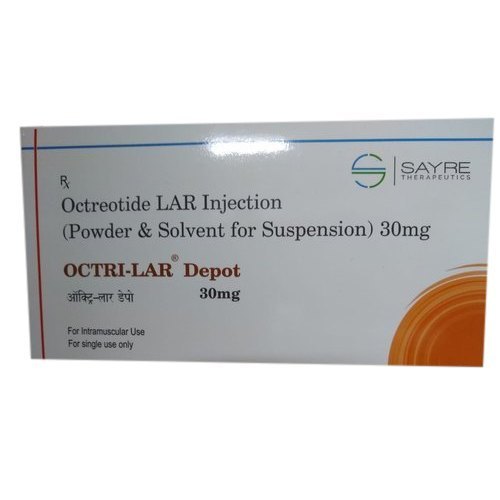Product Introduction:
Octri-Lar Depot 30mg is a long-acting intramuscular injection containing Octreotide, designed for monthly administration. It provides sustained hormone suppression and tumor control, especially in pituitary tumors and gastroenteropancreatic neuroendocrine tumors (GEP-NETs).
Uses:
Octri-Lar Depot 30mg is used in the treatment of:
-
Acromegaly (excess growth hormone)
-
Gastroenteropancreatic neuroendocrine tumors (GEP-NETs)
-
Carcinoid syndrome (diarrhea, flushing due to tumors)
-
VIPomas (vasoactive intestinal peptide-secreting tumors)
-
Glucagonomas and insulinomas
-
Control of hormone secretion from endocrine tumors
Storage Instructions:
-
Store between 2°C to 8°C (refrigerated)
-
Do not freeze
-
Protect from light
-
Once reconstituted, use immediately or within a few hours if stored under refrigeration
-
Keep out of reach of children
How It Works (Mechanism of Action):
Octreotide mimics the action of the natural hormone somatostatin, inhibiting the secretion of growth hormone, insulin, glucagon, gastrin, and other gut peptides. It reduces tumor hormone output and provides symptomatic relief in patients with hormone-producing tumors. It also helps in tumor growth control.
Side Effects:
Common side effects include:
-
Diarrhea or constipation
-
Abdominal pain or bloating
-
Injection site pain or swelling
-
Headache
-
Gallstones or changes in gallbladder function
-
Fatigue
Serious side effects may include:
-
Bradycardia (slow heart rate)
-
Pancreatitis
-
Hyperglycemia or hypoglycemia
-
Liver function abnormalities
-
Severe allergic reactions (rare)
Dosage (Typical Recommended Dose):
-
Standard dose: 30mg once every 4 weeks via deep intramuscular injection
-
Dose may be adjusted based on hormone levels (GH, IGF-1) and clinical response
-
Initial therapy is often started with short-acting octreotide injections before switching to depot formulation
Method of Administration:
-
Administered via deep IM injection into the gluteal muscle
-
Reconstitution is required using the provided diluent and vial adapter
-
Should be administered by a trained healthcare professional
-
Rotate injection sites to minimize discomfort or tissue damage
Precautions:
-
Regular monitoring of gallbladder function (risk of gallstones)
-
Monitor blood sugar levels, especially in diabetic patients
-
Liver and thyroid function should be checked periodically
-
Not recommended during pregnancy unless clearly necessary
-
Use non-hormonal contraception during treatment
-
Caution in patients with cardiac conditions (monitor heart rate)
Drug Interactions:
May interact with:
-
Insulin and oral hypoglycemics – may affect glucose metabolism
-
Beta-blockers, calcium channel blockers – risk of bradycardia
-
Ciclosporin – levels may be reduced
-
Other drugs metabolized via cytochrome P450 enzymes
Allergies:
-
Contraindicated in patients with known hypersensitivity to Octreotide or any component of the formulation
-
Allergic symptoms may include rash, itching, swelling, difficulty breathing – seek emergency medical attention if they occur
Overdose Information:
-
Symptoms of overdose may include bradycardia, hypoglycemia, diarrhea, and abdominal pain
-
Treatment is supportive, including monitoring vital signs and managing symptoms
-
Seek immediate medical care in case of overdose
Missed Dose Instructions:
-
If a scheduled injection is missed, it should be administered as soon as possible
-
Resume normal schedule based on healthcare provider's advice
-
Do not self-inject unless instructed and trained by a healthcare professional
Additional Notes:
-
Periodic monitoring of IGF-1 levels and tumor markers is recommended to assess efficacy
-
Patients should be informed of potential gastrointestinal disturbances and advised on dietary changes if necessary
-
Consider gallbladder ultrasound before initiating long-term therapy
-
May improve quality of life by reducing hormone-related symptoms in NET patients



